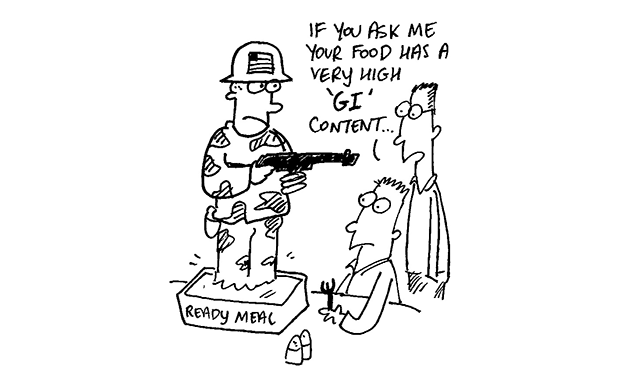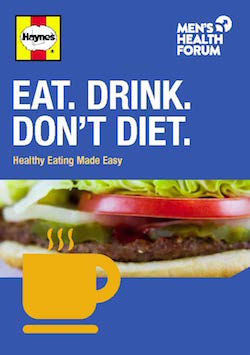Can food help you beat stress?

Studies show we are more likely to eat junk when in a bad mood, but find it easier to make healthy choices when happy. This cuts both ways. In other words, if you eat healthily, you’re more likely to feel happy and cope better with stress.
How does that work?
The chemicals in healthy foods, and the feelings of enjoyable eating influence your mood and impulses: you make better decisions without realising. They can also improve your sleep.
Fish, for example, contains omega-3 fatty acids which boost emotional well-being. A so-called Mediterranean-style diet (which is based on vegetables, fruits, whole grains, fish and beans) is also linked with a more positive mood, especially as you get older.
What's GI?
The way different foods containing carbohydrates (carbs) affect blood sugar level is known as their glycaemic index (GI). Foods that rapidly increase blood sugar have a high GI; foods that have little impact on blood sugar have a low GI.
What's the link between GI and mood swings?
Eating foods with a high GI may feel like a good idea when you’re stressed out and drained of energy, but it’s not. A rise in sugar levels triggers the release of insulin, the hormone which pushes sugar out of your blood stream into your cells. If you eat high GI, the effects of insulin may cause a downfall in blood sugar levels a few hours later, leaving you feeling even more drained.
As your brain cells need more sugar than other tissue, this low blood sugar reduces your ability to concentrate and think straight. In other words, you may feel calm two hours after eating a higher GI (carbohydrate-rich) meal but this may well be followed by a post-meal slump so you are less able to pay attention – this is even more noticeable as you get older.
So, when you’re feeling stressed, go easy on foods with a high GI and select foods with a low to moderate GI. Combining small amounts of food with a high GI (eg mashed potatoes) with those of lower GI (eg beans) also helps prevent up and down swings in blood sugar levels.
Which food are high GI and which low?
HIGH GI so go easy: parsnips, baked potatoes, cornflakes, raisins, donuts, bread, mashed potatoes, dried fruit.
MEDIUM GI so eat moderately: white rice, honey, boiled new potatoes, fresh apricots, bananas, potato chips, sweetcorn, porridge oats, muesli.
LOW GI so eat more freely (but don’t go mad!): carrots, lettuce, tomato, cucumber, peppers, small portion brown rice, mango, Kiwi fruit, unsweetened bran cereal, peas, grapes, sweet potato, baked beans, small portion wholewheat pasta (cooked al dente), orange, apple, pears.
So what's the best combination of foods?
The overall GI of a meal depends on the combination of foods you select and portion sizes. Take a food with a high GI (eg a baked potato). Combine it with a protein source (eg skinned chicken breast). Add a large mixed salad. Result: a healthy, balanced meal. This way of eating is particularly helpful for people with diabetes.
Fill HALF your plate with salad or vegetables, one QUARTER with protein (eg lean meat, fish, eggs, beans) and one QUARTER with starchy carbs (eg brown rice, wholewheat pasta, quinoa, baked potato, noodles). Try a smaller plate. You might be surprised it fills you up and you can still ‘go big’ on green vegetables and salads.
What about time of day?
Levels of the stress hormone, cortisol, are highest in the morning due to the physical ‘stress’ of your overnight fast. Eating a nutritious breakfast is especially important.
Any other tips?
Don’t shop for food when hungry or fed up. You are less likely to make healthy choices. So, if shopping after work (when you might be feeling both), be aware. Perhaps have a banana or apple as a pre-shopping snack.
We don't currently post comments online but are always keen to hear your feedback.
| This content is wholly based on the Men's Health Forum's man manual Eat. Drink. Don't Diet. which was prepared in line with the NHS England Information Standard of which the MHF is a member. Follow the links for more information or to buy copies. |
Date published
18/06/15
Date of last review
28/02/15
Date of next review
28/02/18
|
The Men’s Health Forum need your support It’s tough for men to ask for help but if you don’t ask when you need it, things generally only get worse. So we’re asking. In the UK, one man in five dies before the age of 65. If we had health policies and services that better reflected the needs of the whole population, it might not be like that. But it is. Policies and services and indeed men have been like this for a long time and they don’t change overnight just because we want them to. It’s true that the UK’s men don’t have it bad compared to some other groups. We’re not asking you to ‘feel sorry’ for men or put them first. We’re talking here about something more complicated, something that falls outside the traditional charity fund-raising model of ‘doing something for those less fortunate than ourselves’. That model raises money but it seldom changes much. We’re talking about changing the way we look at the world. There is nothing inevitable about premature male death. Services accessible to all, a population better informed. These would benefit everyone - rich and poor, young and old, male and female - and that’s what we’re campaigning for. We’re not asking you to look at images of pity, we’re just asking you to look around at the society you live in, at the men you know and at the families with sons, fathers and grandads missing. Here’s our fund-raising page - please chip in if you can. |



